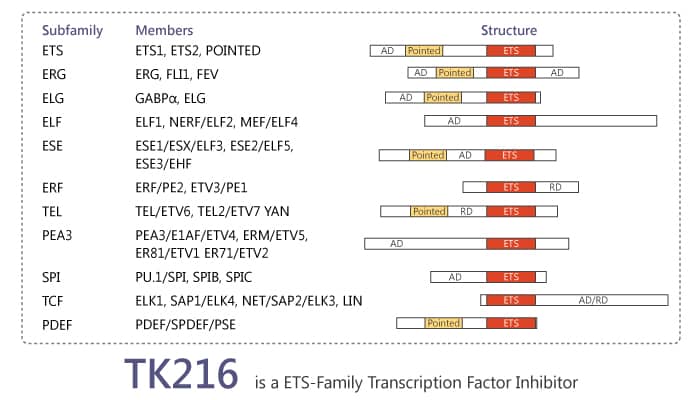The erythroblastosis virus E26 transformation specific (ETS)-transcription factors family comprises 28 proteins sharing a conserved DNA-binding domain. Transcription factors are difficult to target due to their non-enzymatic mechanisms of action. Transcription factors often complex with RNA helicases; these enzymes are key regulators of cellular transformation in cancer. EWS-FLI1 is an Ewing sarcoma (ES) specific fusion oncogene that requires DHX9 for neoplastic transformation. YK-4-279 binds to EWS-FLI1 and blocks its interaction with DHX9, resulting in growth arrest and apoptosis in ES cells TK216 is YK-4-279 derivative developed for clinical trials with demonstrated in vitro and in vivo antitumor activity in ES models. Especially, TK216 is a first-in-class inhibitor of the ETS family.

TK216 targets ETS factors via blocking the protein-protein interaction with RNA helicases, for their anti-lymphoma activity. In particular, TK216 demonstrates an antitumor activity across several lymphoma cell lines. Moreover, TK216 can exert its antitumor activity in different lymphoma subtypes interfering with the function of different ETS factors.
TK216 shows potent dose-dependent antiproliferative activity in most of the cell lines.
TK216 inhibits ABC-DLBCL ( IC50= 375 nM), GCB-DLBCL (IC50=374 nM), MCL (IC50=339 nM), MZL (IC50=292 nM), CLL (IC50=1112 nM), PMBCL (IC50=547 nM), CTCL (IC50=645 nM), PTCL-NOS (IC50=436 nM), ALCL (IC50=193 nM), and canine DLBCL (IC50=815 nM) proliferation. Furthermore, compared with the control group mice treated with TK216 (100 mg/kg, twice a day, orally) clearly present a reduction in tumor growth at day 3 which becomes much apparent with time.
All in all, The ETS inhibitor YK-4-279 and its clinical derivative TK216 represent a new class of ETS inhibitors with in vitro and in vivo antitumor activity in lymphomas.